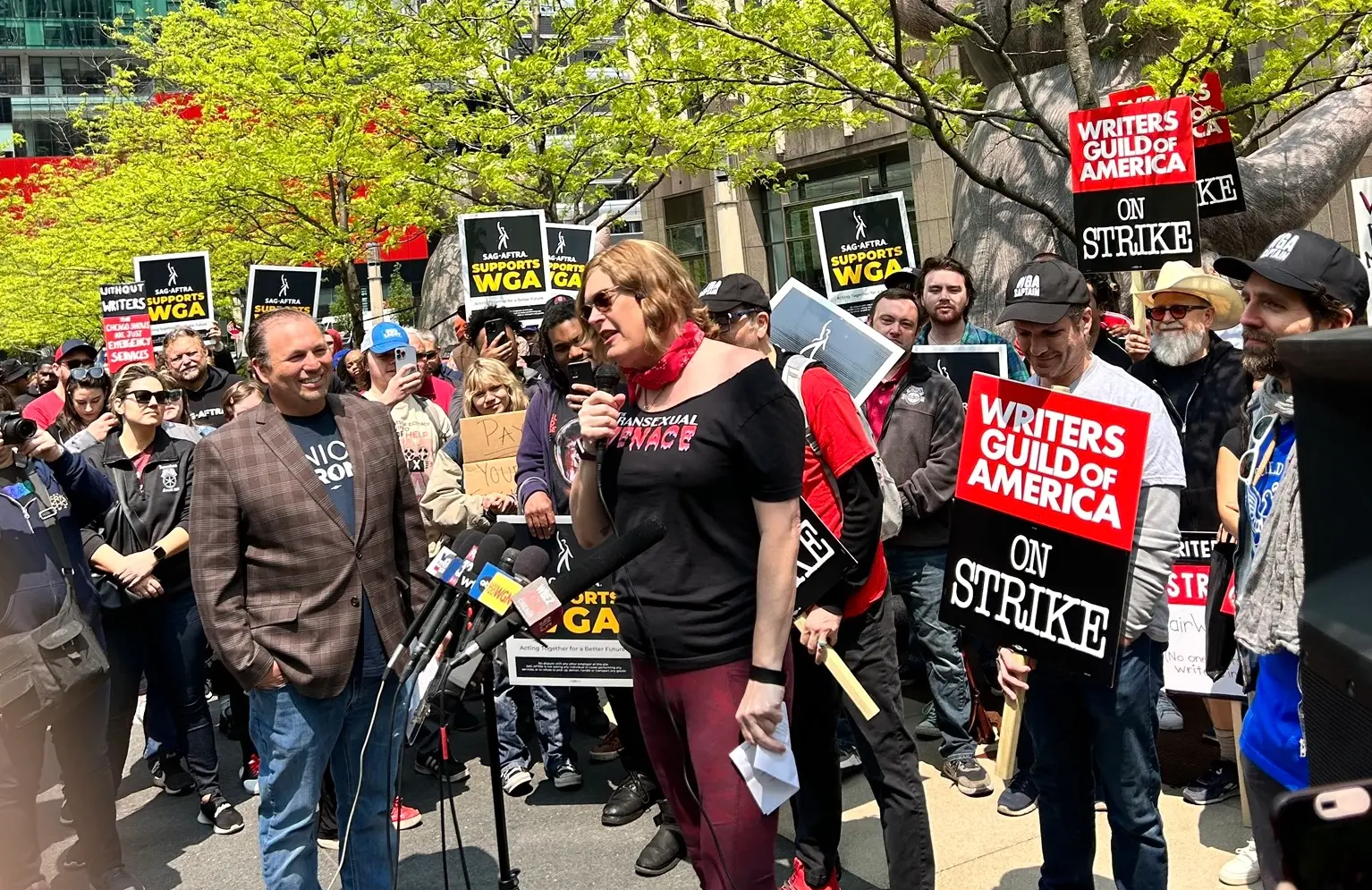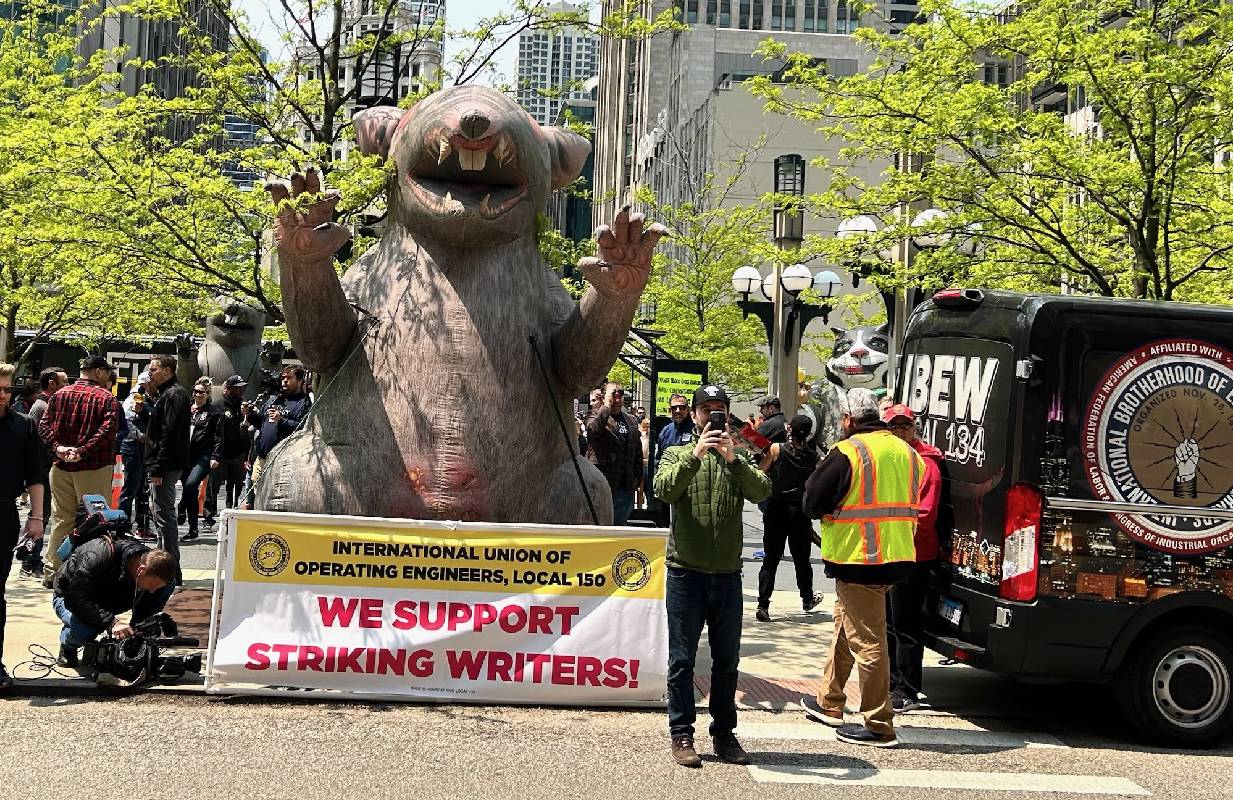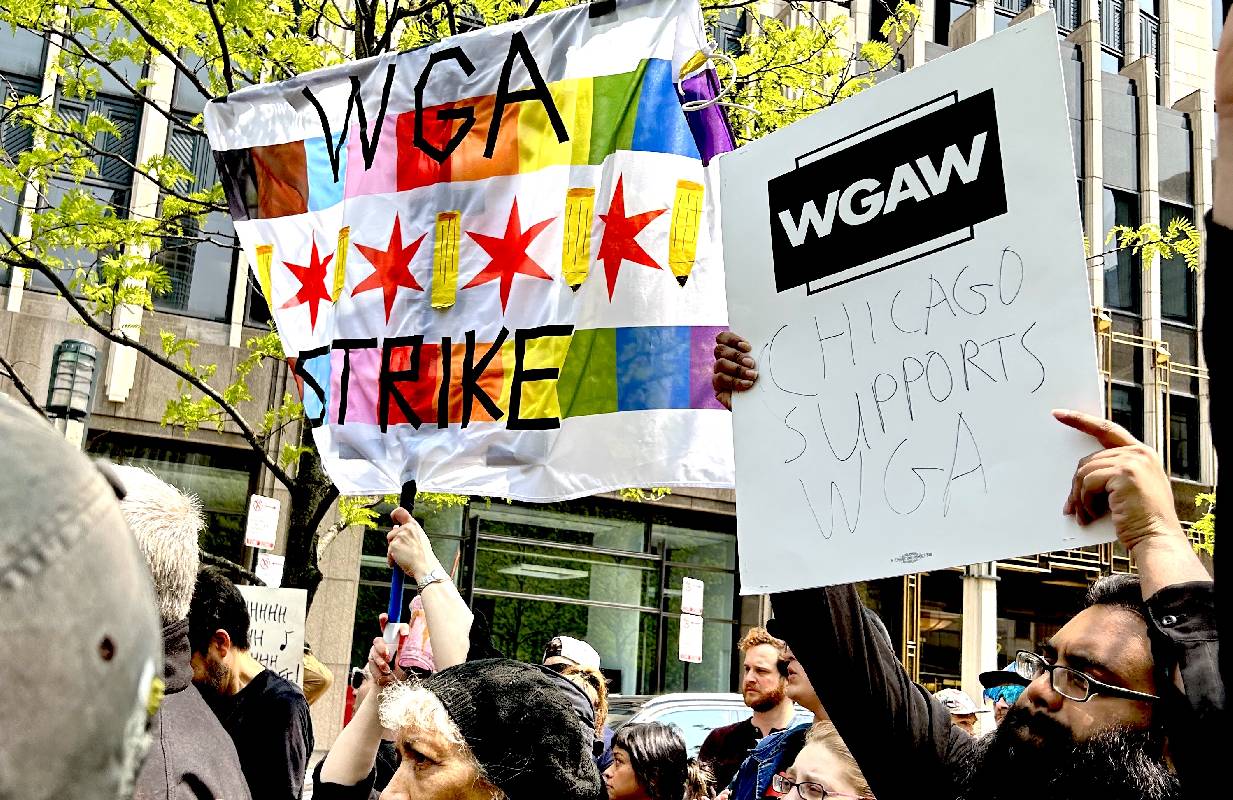The WGA Strike Is Not 'Just a Hollywood Issue'
-
 Lilly Wachowski at the WGA picket line in Chicago on May 17. (Photo: Brianna Wellen)
Lilly Wachowski at the WGA picket line in Chicago on May 17. (Photo: Brianna Wellen)Chicago’s NBC Tower stands with its Peacock poking out from the city’s downtown skyline, nestled just blocks away from Lake Michigan and the Chicago River. On one side of the building is a park, a private area with a small greenhouse. On the other, North Columbus Drive, one of the city’s busiest streets. Picketers supporting the Writers Guild of America got a glimpse of it all as they marched around the building on May 17, making sure every car that whizzed by could see them, every boat in the nearby waterways could hear them, and every executive trying to make their way into the building would have to stop and take notice.
It’s been three weeks since the WGA first went on strike in response to undesirable contract negotiations with the Alliance of Motion Picture and Television Producers (AMPTP), and in that time there have been daily pickets in the major industry hubs of New York and LA (also where the WGA West and WGA East chapters are headquartered). And it was clear on May 17 that plenty of Midwesterners — including some who came to the picket line from Wisconsin, Indiana, and Ohio — had been itching to get in on the action. The industry has greatly expanded since the WGA last went on strike in 2007, and especially in the years since COVID first hit, access to virtual writers rooms has made it easier for people outside of those industry hubs to work on TV shows.
Still, things looked a little different on the lines in Chicago. There were far fewer celebrities, though folks like Lilly Wachowski, Gillian Flynn, Bobcat Goldthwait, Abby McEnany, and Tim Kazurinsky did make an appearance. There was no impromptu performance by Imagine Dragons or Weezer. But there were at least four giant inflatable animals (Illinois’ own Scabby the Rat among them) and members from unions of all industries out to support.
Cries of “Get up, get down, Chicago is a union town” dominated the picket line that was filled with not only WGA members but representatives from other industry-related unions like SAG-AFTRA, IATSE, and DGA, along with the Chicago Teachers Union, International Union of Operating Engineers, Laborers’ International Union of North America, International Brotherhood of Electrical Workers, Chicago Federation of Labor, and the Teamsters. The overwhelming presence of people from outside of the entertainment industry was a reminder that what the WGA is currently fighting for affects a much larger group of workers.
“It’s not just a Hollywood issue,” SAG-AFTRA member Pam Tierney (Shining Girls), who was on the picket line showing support, says. “It’s going to hit everybody.”

There are three main issues that WGA members are fighting against: decreasing residual pay for writers on TV shows, particularly those on streaming; the rise of “mini rooms” that creates fewer writing jobs on TV shows and takes writers out of the production process, meaning that once filming starts, they stop getting paid; and, perhaps the biggest sticking point, the introduction of AI-generated scripts, eliminating the need for writers entirely. Essentially, industry higher-ups are trying to increasingly turn writing into a gig economy, offering the shortest possible employment periods for the least amount of money, and ultimately eliminating any path to career advancement.
“I’ve witnessed the quick erosion of the writers’ room in real-time,” WGA West member Minhal Baig (Ramy, BoJack Horseman) said during the Chicago picket. “Writers’ rooms that were once 20-week-long jobs became shorter and shorter. The rooms got smaller. There were fewer opportunities for lower-level writers. Staff writers practically became non-existent. I was told by more experienced writers that going to set to produce your episode was part of the job. I’ve never known it.”
What it really comes down to is a request for fair employment opportunities and fair pay — the WGA’s proposal asked for an additional $429 million per year for the Guild’s 11,500 members, a number that pales in comparison to the $30 billion in industry profits reported in 2021. During negotiations, the AMPTP’s countered with an increase of just $86 million per year. On just day two of the strike, Collider reported that the U.S. entertainment industry lost more than $10 billion in share value. There have also been major studio budget deficits as the strike has continued to shut down productions.
According to Brett Neveu, WGA East member and Chicago strike captain, the fight is really just a continuation of what the WGA was asking for when its members went on strike in 2007. At that time, Neveu had just moved to L.A. and joined the guild. The fight then, he says, was still over digital advancements in the industry, with the WGA asking for compensation for its members who worked on projects for “new media,” which essentially amounted to the emerging streaming services. Now, writers are still fighting for a bigger piece of the streaming industry pie, and the “new media” of the day is AI. But Neveu says that technology is also a bigger player in favor of the WGA’s fight.
“Social media, connectivity, we’re all able to speak to each other,” Neveu says. “I can’t believe the post we had about the event went so completely crazy, and that’s where we heard from all the unions who came out to support. We did not have that 15 years ago, we just had email and where you go and where you stand and where you sign in.”
It was through a call on social media that Neveu was able to gather a handful of union supporters to shut down production on Showtime’s The Chi indefinitely. A tweet sent out by the WGA East on May 12 calling for urgent action got the attention of enough Chicagoans to halt filming that same day. Then the WGA got wind of a directive to those working on the show to show up for filming on May 15 at 4:00 AM to avoid picketers — Neveu tweeted out a photo from the production site at 2:45 AM, and soon was joined by enough people, including Chicago native and The Matrix co-creator Lilly Wachowski, to stop production on the show for the season. Those calls on social media also got the attention of other unions, like IATSE and the Chicago Federation of Labor, a the support and organization of larger unions in the city, which also utilized their social media networks to spread the word, is ultimately what led to more than 800 people picketing outside of Chicago’s NBC Tower just days later.
All these actions show that organizing in support of WGA can happen beyond New York City and L.A. The same can be said for a recent call to action in Boston, where the WGA picketed Warner Bros. Discovery CEO David Zaslav’s commencement speech at Boston University, and the shutting down of production on shows like Starz’s P-Valley (filming in Atlanta), an untitled drama from Ava DuVernay (filming in Wilmington, North Carolina), and Apple TV+’s Sinking Spring (filming in Newton Square, Pennsylvania). These shutdowns have an effect on local economies, too: According to the WGA, if things are moving at the rate of the 2007 strike, which ultimately cost California around $2.1 billion, the strike is currently costing the state’s economy $30 million dollars a day, which affects restaurants, dry-cleaners, and other businesses who look to those in the entertainment industry for patronage.
But there’s more at stake here than fair working conditions in the entertainment industry. Automation threatens jobs across all trades, whether it’s self-checkout taking the place of grocery store clerks or ChatGPT performing the job of coders. Giving even an inch more to the AI takeover will cause these replacements to become more and more common.
“I see AI and the refusal of the studios and networks to hit the pause button on its usages as the threat that it is, a naked grab for power,” said Lilly Wachowski on the Chicago picket line. “In effect, they see AI as an opportunity to eliminate jobs and hoard an ever-increasing mass of wealth. When you zoom out, you can see this as an assault on the middle class. This tilting of the scales of wealth and equality is a global infliction. And so in that regard, I’m also here for my brothers and sisters and siblings who you see rising up in multitudes and forming unions across this country.”
A strike of this magnitude also affects multiple industries by introducing new generations to unions and the power of collective action. Several groups of college students showed up to the Chicago demonstration; some were there to express support for an industry they hope to one day enter, while others came to learn more about what they’ve been seeing on the news and the purpose of these actions.
“I’ve never been taught anything about organizing or joining a union, I’ve never been taught how to advocate for myself to get equal pay, to get paid a fair wage,” says Gia Clarke, a journalism student in the city. “Unfortunately I think that we do live in a capitalist society so obviously that makes it possible to undermine everyone as much as possible, but especially people who want to pursue creative fields.”
This show of solidarity is increasingly important as more unions are on the verge of contract renewal. SAG-AFTRA called for a strike authorization vote just before it is set to renegotiate with AMPTP on June 7. That especially puts a damper on networks' recent “strike-proof” schedules, which took only into account the absence of writers, not actors or directors (the DGA’s contract is up for renegotiation on June 30). A SAG-AFTRA strike would be just as significant to maintaining the momentum as the role that other crew unions have played in shutting productions down in solidarity with the WGA.

That support was evident during the WGA’s shutdown of The Chi. On May 15, Teamsters lined up trucks outside of the set, helping to create an impenetrable picket line, which IATSE members working on the production refused to cross, turning their own trucks around. That collaborative display, as well as the presence of those same unions on the picket line days later at NBC Tower, is in part because those groups know they can count on the support of the WGA in return.
“We’ve got all these unions out here supporting us because they know if we get screwed, they get screwed,” says WGA West member Heather Ash (Stargate SG-1), who was picketing at The Chi set. "It’s solidarity, we’re all in this together, artists, mechanics, drivers, everybody, we just want to get paid what’s fair. We didn’t do this, the AMTMP did this, and we just want them to know that if they’re going to try this, we’re going to respond with union might.”
Disclosure: The author of this article is a member of WGA East.
Brianna Wellen is a TV Reporter at Primetimer who became obsessed with television when her parents let her stay up late to watch E.R.
TOPICS: TV Writers' Strike, The Chi, Abby McEnany, Bobcat Goldthwait, Gillian Flynn, Lilly Wachowski, Minhal Baig, SAG-AFTRA, Writers Guild of America